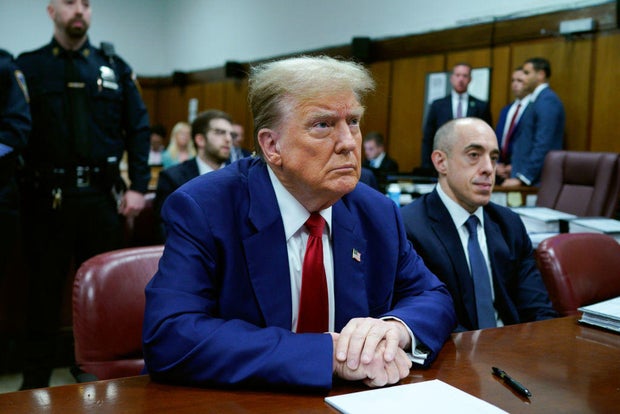The third week of former President Donald Trump’s New York criminal trial resumed Tuesday with continued testimony from its third witness and a pair of rulings from the judge on outstanding issues related to the case.
Before testimony resumed, Judge Juan Merchan found Trump in contempt of court for violating a gag order limiting what Trump can say about those involved in the case. The judge fined him $1,000 for each violation.
Merchan also ruled that Trump can attend his son Barron’s high school graduation on May 17, rather than attend the trial. Eric Trump, another one of the former president’s sons, is in the courtroom for Tuesday’s proceedings, the first time one of Trump’s family members has accompanied him to court.
On the stand, bank executive Gary Farro testified how Michael Cohen, Trump’s former personal attorney, urgently opened a new account to wire $130,000 in “hush money” to Stormy Daniels’ lawyer days before the 2016 election.
Farro worked at First Republic Bank when Cohen paid Daniels in exchange for her silence about an alleged sexual encounter with Trump. Prosecutors say the arrangement was intended to protect Trump’s campaign, and that Trump falsified records when repaying Cohen to hide the alleged scheme.
Trump has pleaded not guilty to 34 felony falsification of business records counts in the case and has denied all allegations, including that he had an extramarital sexual encounter. The trial’s first witness, former National Enquirer publisher David Pecker, testified that Cohen and Trump were determined to suppress the story, because they believed it would harm Trump’s chances of winning the presidency.
What’s happening at Trump’s trial
Merchan began the third week of proceedings by giving Trump good and bad news. He approved a request by Trump that he be allowed to forgo proceedings on May 17 to attend his son’s high school graduation.
But then the judge issued the ruling that prosecutors have sought for more than a week, holding Trump in contempt of court for violating his gag order. He warned Trump that he could be jailed if he violates the order again.
Merchan said Trump violated the order nine times in recent weeks in posts on Trump’s Truth Social platform and campaign website. He fined Trump $9,000, or $1,000 for each violation, and ordered him to delete the posts. He noted in his written ruling that New York law doesn’t allow him to impose a fine of more than $1,000 per violation, and said that amount might not dissuade future violations by defendants who can afford to pay the fine.
Merchan concluded the written ruling with a warning to Trump: “Defendant is hereby warned that the Court will not tolerate continued willful violations of its lawful orders and that if necessary and appropriate under the circumstances, it will impose an incarceratory punishment.”
After the contempt ruling, Farro retook the stand.
He walked a prosecutor through a harried series of emails and phone calls on Oct. 26, 2016 and Oct. 27, 2016, when Cohen set up the new bank account and funded it with $131,000 from his own personal home equity line of credit.
The next day, Cohen authorized a transfer of $130,000 to an account associated with Keith Davidson, an attorney for Daniels. Cohen had described the account and transaction as related to real estate consulting, Farro testified, reiterating that the request was “urgent.”
Farro said the transaction would have been delayed if Cohen indicated the transfer involved either a political candidate or an adult film star. He said any transaction involving a political candidate would have received “additional scrutiny” to ensure it was legal.
But he offered a different explanation of why the bank would have scrutinized a payment to Daniels. He said the bank was wary of facilitating the adult film industry.
“For something like that, we might have considered that a reputational risk,” Farro said.

